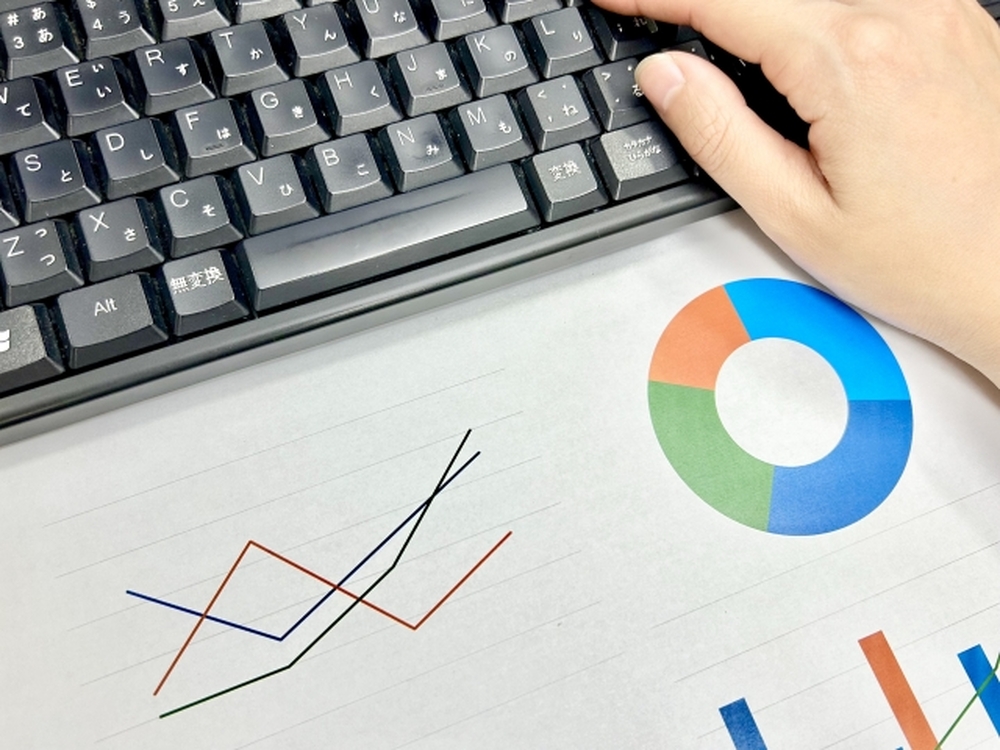近年、データ分析はビジネスの成功に不可欠な要素となっています。しかし、「データアナリスト」と「データサイエンティスト」という似たような職種があり、それぞれの役割や仕事内容の違いがわかりにくいと感じる方も多いのではないでしょうか。
そこで今回は、データアナリスト・データサイエンティストのそれぞれの役割や必要なスキルセット、仕事内容の違いについて解説します。また、両者が持つ共通点や、データアナリスト・データサイエンティスト以外のデータを扱う職種との違いも解説しているので、ぜひ参考にしてください。

近年、データ分析はビジネスの成功に不可欠な要素となっています。しかし、「データアナリスト」と「データサイエンティスト」という似たような職種があり、それぞれの役割や仕事内容の違いがわかりにくいと感じる方も多いのではないでしょうか。
そこで今回は、データアナリスト・データサイエンティストのそれぞれの役割や必要なスキルセット、仕事内容の違いについて解説します。また、両者が持つ共通点や、データアナリスト・データサイエンティスト以外のデータを扱う職種との違いも解説しているので、ぜひ参考にしてください。
In recent years, data analysis has become an integral part of business success. However, there are two similar job titles, "data analyst" and "data scientist," and many people may find it difficult to understand the difference between their respective roles and job descriptions.
In this article, we will explain the differences between the respective roles of data analysts and data scientists, the skill sets required, and the job descriptions. We also explain the commonalities they share and the differences between them and other data-handling jobs other than data analyst and data scientist.

ここからはデータアナリストとデータサイエンティストの違いについて、以下7つの観点から解説していきます。
1つずつ見ていきましょう。
まずは、データアナリストとデータサイエンティストの役割の違いを解説します。
データアナリストは、企業にとって「宝の山」であるデータを収集・分析し、そこからビジネスに役立つ情報を導き出す専門職です。導き出した分析結果にもとづいて、課題解決や意思決定のための提案を行い、企業活動に貢献することが主な役割です。
2000年代初頭のインターネット経済の拡大に伴い、eコマースやオンラインサービスが爆発的に増加し、企業はWebサイトのトラフィック分析や顧客行動の理解に関心を持ち始め、データ分析の重要性が高まりました。
データベース管理や簡単な分析を行うIT専門家やアナリストといった職種はかなり前から存在していましたが、この頃から「データアナリスト」という職種がより明確に定義され、データを用いた意思決定支援が注目されるようになったのです。
データサイエンティストは、数学や統計学、情報工学などを駆使して、膨大なデータを分析し、ビジネスの意思決定や問題解決に役立つ知見を引き出す職種です。日々の業務で蓄積されたデータを分析し、未来を予測したり、新たな価値を生み出すためのモデルを構築したりすることで、企業のビジネス戦略における意思決定を促進するのがこの職種の主な役割です。
データアナリストが「現状分析」から得た情報をもとに課題解決に向けた提案を行うのに対し、データサイエンティストは「未来予測」に重点き、高度な統計学や機械学習などの技術を用いて、新たなビジネスチャンスの創出に向けた提案を行うという点で役割が異なります。
この職種が重要視され始めたのは、ビッグデータの増加とその利用価値の認識が広がったことに起因します。情報技術の発展に伴い、企業が管理するデータ量は増加し続けており、このような情報が溢れる現代においてビジネスで競合他社との優位性を図るためには、これらの情報を戦略的に分析・活用しなくてはなりません。
かつてはデータ関連の業務は分業されていましたが、戦略的なデータ利用が必要とされる現代において、これらの業務が1つの専門分野として統合され、データサイエンティストという職種が誕生したのです。
ここからは、データアナリストとデータサイエンティストそれぞれの具体的な仕事内容を解説します。
データアナリストは、クライアントの直面するさまざまな問題を解決するために、どのデータが必要かを見極め、統計学的な手法を駆使して、データから価値ある情報を導き出します。得られたデータをもとにして、実行可能な提案を行い、ビジネスの意思決定プロセスに貢献します。分析結果をクライアントにわかりやすく伝えるために、図や表で視覚的に示し、レポーティングすることも重要な業務です。
【主な仕事内容】
また、データアナリストは大きく「コンサル型」「エンジニア型」の2つのタイプに分けられます。コンサル型はその名の通り、分析結果にもとづいて問題解決策を提案し、その実施計画と効果の検証を行うことが主な任務です。
これに対して、エンジニア型は分析結果を用いてサービスの品質改善やシステム開発に携わります。こちらはプログラミングスキルを活かして直接システムの開発や改善に取り組む場合もあり、とくにWebサービス運営企業やテクノロジー関連企業での需要が高いです。
コンサル型とエンジニア型にはそれぞれに特徴がありますが、その職域には必ずしも厳格な区分は存在せず、役割は勤務する企業によって異なる場合があります。場合によっては、1人のデータアナリストが両方の業務を兼務することもあります。
データサイエンティストの仕事内容は、企業のデータ分析を行うための環境構築から、データ収集・加工、分析、レポート作成、提案まで多岐に渡ります。
【主な仕事内容】
企業の課題把握やレポーティングといった業務はデータアナリストと共通しますが、データサイエンティストはこれに加えて、データを蓄積するためのデータベース環境の構築や、機械学習アルゴリズムの実装、分析モデルの構築なども行い、データアナリストよりも技術者的な要素が強いことが特徴です。また、統計的な分析にとどまらず、機械学習やプログラミングなど高度なスキルを活かして、より複雑なデータも分析していきます。
データアナリストとデータサイエンティストでは「ビッグデータを活用して企業活動に貢献する」という目的は同じですが、上記のように担当する業務範囲は微妙に異なります。とはいえ、実際の現場では厳密に線引きがされている訳ではなく、企業によってはデータアナリストをデータサイエンティストとして募集しているケースもあるので、よく確認することが大切です。
続いては、それぞれの年収の違いを見ていきましょう。
株式会社カカクコムが運営する求人ボックスの調査(2024年2月時点)によれば、データアナリストの平均年収は正社員で696万円となっており、これは国内の平均年収458万円(国税庁「令和4年分民間給与実態統計調査結果」のデータ)と比較してもかなり高水準であることがわかります。
年収は、年齢や地域、勤務先、そして個人のスキルや経験値などによっても変わりますが、高いスキルを持っていれば年収1,000万円を目指すことも可能です。
実際にユナイテッドワールド株式会社が掲載している求人情報内で「データアナリスト求人」で検索をかけると、次のような求人案件がヒットしました。

転職エージェント「ユナイテッドワールド株式会社」の求人ページ

転職エージェント「ユナイテッドワールド株式会社」の求人ページ
同じく、求人ボックスが行った調査(2024年2月時点)によると、データサイエンティストの平均年収は647万円でデータアナリストよりも約50万円低い相場となっています。
しかし、正社員という括りで比較してみるとデータアナリストが608〜703万円であるのに対し、データサイエンティストは612〜717万円とやや高い水準となっているようです。
参照:
求人ボックス給料ナビ「データアナリストの仕事の年収・時給・給料(求人統計データ)」
求人ボックス給料ナビ「データサイエンティストの仕事の年収・時給・給料(求人統計データ)」
なお、データサイエンティストの平均年収は、情報源によって大きなばらつきがあるため(厚生労働省運営のjob tagで約558万円、データサイエンティスト協会で791万円、dodaで532万円)、情報を参考にする際には注意が必要です。
こちらも実際に検索をかけてみると、次のような求人がヒットしました。

転職エージェント「ユナイテッドワールド株式会社」の求人ページ

転職エージェント「ユナイテッドワールド株式会社」の求人ページ

転職エージェント「ユナイテッドワールド株式会社」の求人ページ
データアナリストと同様に、求められるスキルや経験などによって年収は変動しますが、データサイエンティストの求人数はデータアナリストに比べて豊富で、年収も1,000万円超えを提示している企業が多く存在します。
次に、データアナリストとデータサイエンティストで求められるスキルの違いを紹介します。
データアナリストが担う業務は多岐に渡り、それを遂行するためには以下のようなスキルが求められます。
| ITスキル | ・統計学や数学などのデータ分析手法に関する知識 ・プログラミングスキル(SQL、Python、Rなど) ・データの可視化スキル(ExcelやBIツールの操作スキル) ・データベースの利用スキル |
|---|---|
| ビジネススキル | ・関連業界・分野の知識 ・コミュニケーションスキル ・ドキュメント作成スキル ・論理的思考力 ・問題解決能力 |
ただし、前述したように、この職種はコンサル型とエンジニア型の2つのタイプが存在します。データアナリストという大きな括りでは上記のようなスキルが必須となりますが、コンサル型、エンジニア型どちらを目指すのかによって、求められる応用的な知識レベルは異なります。
コンサル型は、データ分析を通じて問題解決策を提案することが主な業務となるため、クライアントに対し解決策を具体的に提示しなければなりません。そのためには、データ分析から得た情報を問題解決に活かすための論理的思考力がとくに重要です。一方、エンジニア型はデータの分析結果をもとにサービス改善やシステム開発に取り組むため、プログラミング言語の習熟度や分析ツールの操作スキルがより強く要求されます。
近年は、コンサル型とエンジニア型の両方のスキルを身につけるデータアナリストも増えています。両方のスキルを身につけることで、より幅広い仕事に挑戦できるでしょう。
データサイエンティストに求められるスキルは、データアナリストと共通する部分が多く、たとえば統計学や数学の知識、プログラミング言語を扱えるスキル、ドキュメント作成スキルなどはどちらの職種にも求められます。
| ITスキル | ・統計学や数学、機械学習、データマイニングなどのデータ分析手法に関する知識 ・プログラミングスキル(SQL、Python、Rなど) ・データの可視化スキル(BIツールの操作スキルなど) ・データベースの利用スキル ・機械学習・深層学習などのアルゴリズムの知識 |
|---|---|
| ビジネススキル | ・関連業界・分野の知識 ・コミュニケーションスキル ・ドキュメント作成スキル ・論理的思考力 ・問題解決能力 ・マネジメントスキル |
異なる部分として、データサイエンティストは高度な分析を行うために、自ら環境を構築するということです。データ分析のための環境構築、分析アルゴリズムの選定、予測モデルの実装なども担当するため、その分求められるスキルの領域も広くなります。
データアナリスト は、既存の環境を活用してデータ分析を行うことがほとんどなので、環境構築に関するスキルは比較的軽度です。データアナリストにとって重要なのは、ビジネス課題を理解し、適切な分析手法を用いて課題解決に貢献することです。 環境構築はあくまでも手段の1つであるため、必要最低限のスキルを習得すれば十分でしょう。
また、データサイエンティストはAIや機械学習を使いこなすうえで、より高度かつ幅広い統計学やプログラミングの知識・スキルが求められます。
続いて、それぞれの職種におけるキャリアの違いを見ていきましょう。
データアナリストのキャリアパスとしては、ジュニアからミドル、そしてシニアデータアナリストへと進み、最終的にはデータ分析マネージャーやデータ分析リーダーになる道があります。また、専門性を深めてBI(ビジネスインテリジェンス)コンサルタントになるほか、領域を広げてデータサイエンティストなどのポジションを目指すことも可能です。
【データアナリストの主なキャリアパス例】
キャリアパスは、技術的な専門性をさらに深めることで、シニアデータサイエンティストやデータサイエンスチームのプロジェクトマネージャー、あるいはCDO(チーフデータオフィサー)のような経営層へと進むことが期待されます。また、特定の技術や業界に特化し、専門のコンサルタントとして独立する道もあるでしょう。
【データサイエンティストの主なキャリアパス例】
近年、データ分析の重要性が高まるにつれ、データ分析スキルを持つ経営コンサルタントの需要が急速に高まっているため、経営コンサルタントへのキャリアチェンジを目指す方も増えています。
次に、それぞれの将来性の違いについて解説します。
近年、あらゆる業界でデータ量が爆発的に増加し、その利活用が企業の競争力向上に不可欠なものとなっています。データ分析を通じて、顧客の行動分析、市場調査、リスク管理、業務効率化など、さまざまな課題解決が可能となったことで、データを扱える人材は企業の成長を支える重要な役割を担っています。
こうした背景から、データ分析スキルを持つデータアナリストの需要は、今後もますます高まっていくことが予想されます。
しかし、将来性が高い一方で、データアナリストとして活躍するためには、単なるデータ分析スキルだけでは不十分です。企業の課題を理解し、データ分析結果にもとづいて具体的な提案を行う論理的思考力やビジネス知識、コミュニケーションスキル、そして常に最新の技術を学び続ける姿勢が求められます。
こうしたスキルを磨き、企業の課題解決に貢献できるデータアナリストは、今後も高い需要を得られるでしょう。
データサイエンティストの需要も、年々右肩上がりに上昇しており、将来性が高いとされている職種の1つです。とくに、機械学習やディープラーニングを活用して新しい製品やサービスの開発に貢献できるデータサイエンティストは、企業にとって非常に価値が高く、その需要は今後も拡大の一途を辿ると予測されています。
矢野経済研究所の調査によれば、今後データ分析関連人材(データサイエンティスト、分析コンサルタント、分析アーキテクト、プロジェクトマネージャー)の不足は深刻さを増し、2025年には176,300人に達すると見込まれています。
自身の強みを最大限に発揮し、年収アップやキャリアアップを図るためには、その職種が自分の適性に合う仕事かを確認しておくことも大切です。ここでは、データアナリストとデータサイエンティストそれぞれの職種に向いている人の特徴を見ていきます。
データアナリストに向いている人は、数字やデータを長時間扱うことが苦にならない人です。具体的には、数学や統計学に興味があり、Excelでのデータ処理が得意な人や、日常生活でも自然と数字で物事を考える習慣がある人に適しています。
データアナリストの日常は、数字やデータを扱っている時間が大半を占めます。そのため、少なくとも日常的に数字を見ることに抵抗がないことが絶対条件といえるでしょう。
また、知的好奇心が強く、新しいことを学ぶことが好きな人や、几帳面で細かい作業が得意な人も向いているとされています。データアナリストとして活躍するには、ビジネススキルはもちろん、統計学やITスキルが求められるため、これらの知識を継続的に更新していく必要があります。
とくに、これまでシステムエンジニアやプログラマーとして活躍してきた人で「プログラミングスキルには自信がある」「より数学、統計学を扱う職種にキャリアアップしたい」という人にはエンジニア型データアナリストが、これまでにコンサルタントなどの実務経験がある方はコンサル型データアナリストが適性でしょう。
データサイエンティストはデータアナリストよりも対応する業務領域が広いですが、業務の中心にあるのは同様に「データ分析」です。そのため、データアナリストと同じく数字やデータを扱うことに対して抵抗がない人でなければなりません。
また、この職種では膨大なデータのなかから未知のパターンや関連性を見つけ出し、それをビジネスや科学的な問題解決に応用することが求められます。そのため、既存の知識や手法に満足せず、常に新しいアイデアや解決策を求め、データの奥深くを探究する好奇心が不可欠になります。
加えて、新しい技術やアルゴリズムに対して絶えず好奇心を持ち、自分自身で新しい知識を積極的に学んでいく姿勢もデータサイエンティストには欠かせません。技術は日々進歩しており、新しいアルゴリズムやデータ処理技術が絶えず登場しています。そのため、最新の技術動向に敏感であり、それを自らのプロジェクトに取り入れられる柔軟性と学習能力が求められます。

The following seven perspectives will now explain the differences between data analysts and data scientists.
Let's look at them one by one.
First, we will explain the difference between the roles of a data analyst and a data scientist.
A data analyst is a professional who collects and analyzes data, which is a "treasure trove" for companies, and derives useful information for business. Their main role is to contribute to corporate activities by providing proposals for problem solving and decision making based on the analysis results they derive.
With the expansion of the Internet economy in the early 2000s, e-commerce and online services exploded, and companies began to take an interest in analyzing website traffic and understanding customer behavior, making data analysis increasingly important.
Although job titles such as IT specialists and analysts who manage databases and perform simple analyses have existed for quite some time, it was around this time that the job title of "data analyst" was more clearly defined and decision support using data became a focus of attention.
Data scientists use mathematics, statistics, and information engineering to analyze vast amounts of data and extract knowledge that is useful for business decision-making and problem-solving. The main role of this position is to facilitate decision-making in corporate business strategies by analyzing data accumulated in daily operations, predicting the future, and building models to create new value.
The role of a data scientist differs from that of a data analyst in that a data analyst makes proposals to solve problems based on information obtained from "current situation analysis," while a data scientist focuses on "future prediction" and makes proposals to create new business opportunities using advanced statistics, machine learning, and other technologies.
The importance of this position has begun to grow due to the increase in big data and the widespread recognition of the value of its use. With the development of information technology, the amount of data managed by companies continues to increase, and in order to gain an edge over competitors in business in this information-rich age, this information must be strategically analyzed and utilized.
In the past, data-related tasks were divided into separate divisions of labor, but today, when strategic use of data is required, these tasks have been integrated into a single specialized field, giving rise to the data scientist profession.
The following sections describe specific job descriptions for each of the data analyst and data scientist.
Data analysts determine which data is needed to solve various problems faced by clients and use statistical methods to derive valuable information from the data. Based on the data obtained, they make actionable recommendations and contribute to the business decision-making process. Reporting and presenting the results of analysis visually in charts and tables to clients in an easy-to-understand manner is also an important part of the job.
Main job responsibilities
In addition, data analysts can be broadly divided into two types: "consulting type" and "engineering type. As the name suggests, the consulting type is primarily responsible for proposing problem-solving measures based on analysis results, planning their implementation, and verifying their effectiveness.
On the other hand, engineers are involved in service quality improvement and system development using the analysis results. In some cases, this type of work involves directly developing and improving systems by utilizing programming skills, and is in particularly high demand at web service management companies and technology-related companies.
While consulting and engineering have their own characteristics, there is no strict division between the two types of positions, and the role may vary depending on the company where the employee works. In some cases, a single data analyst may perform both duties concurrently.
The work of a data scientist ranges from building an environment for conducting corporate data analysis, to data collection and processing, analysis, report writing, and proposals.
The main job responsibilities of a data scientist include
While tasks such as understanding corporate issues and reporting are common to those of data analysts, data scientists also build database environments for storing data, implement machine learning algorithms, and build analytical models, and are characterized by a more technical element than data analysts. This is a characteristic of data scientists. In addition to statistical analysis, data scientists also analyze more complex data by utilizing advanced skills such as machine learning and programming.
Although data analysts and data scientists have the same objective of "contributing to corporate activities by utilizing big data," the scope of work they are responsible for is slightly different as described above. However, there is no strict line between the two in practice, and some companies recruit data analysts as data scientists, so it is important to check carefully.
Next, let's take a look at the differences in their annual salaries.
According to a survey conducted by Kakaku.com's Job Box (as of February 2024), the average annual salary of a full-time data analyst is 6.96 million yen, which is considerably higher than the average annual salary in Japan of 4.58 million yen (data from the National Tax Agency's "2022 Statistical Survey of Private Salaries"). The data is also available from the National Tax Agency's "Survey of Private Sector Salaries in 2022.
Annual Salary for Data Analysts
Annual salary varies depending on age, region, place of employment, and personal skills and experience, but it is possible to aim for an annual salary of 10 million yen if you are highly skilled.
In fact, a search for "data analyst jobs" within the job information posted by United World, Inc.

Job page of recruitment agency "United World Inc.
Job Seeker Page for "United World Inc.
According to the same survey conducted by Jobbox (as of February 2024), the average annual salary of a data scientist is 6.47 million yen, about 500,000 yen lower than that of a data analyst.
However, when compared as full-time employees, data analysts earn between 6.08 and 7.03 million yen, while data scientists earn between 6.12 and 7.17 million yen, a slightly higher level.
See also:
Job Box Salary Navigator, "Annual salary, hourly wage, and salary for data analyst jobs (job statistics)"
Job Box Salary Navigator, “Annual salary, hourly wage, and salary for data scientist jobs (job statistics data)”
Note that the average annual salary for data scientists varies greatly depending on the source of information (approximately 5.58 million yen on job tag operated by the Ministry of Health, Labor and Welfare, 7.91 million yen on Japan Association of Data Scientists, and 5.32 million yen on doda), so care should be taken when referring to information.

Job page of the recruitment agency "United World Inc.

Job page of the recruitment agency "United World Inc.

Job page of the recruitment agency "United World Inc.
As with data analysts, annual salaries vary depending on the skills and experience required, but data scientists have more job openings than data analysts, and many companies are offering annual salaries in excess of 10 million yen.
Next, we will introduce the differences in skills required of data analysts and data scientists.
Data analysts are responsible for a wide range of tasks, and the following skills are required to perform them.
| IT skills | ・Knowledge of data analysis methods such as statistics and mathematics ・Programming skills (SQL, Python, R, etc.) ・Data visualization skills (Excel and BI tools) ・Database usage skills |
|---|---|
| Business skills | ・Knowledge of related industries and fields ・Communication skills ・Document preparation skills ・Logical thinking skills ・Problem-solving skills |
However, as mentioned above, there are two types of this position: consulting and engineering. Although the above skills are essential in the broad category of data analyst, the level of applied knowledge required differs depending on whether you are aiming for a consulting or engineering type.
The main task of consultants is to propose solutions to problems through data analysis, so they must be able to present concrete solutions to clients. For this reason, it is especially important to have the ability to think logically in order to utilize the information obtained from data analysis to solve problems. On the other hand, engineers are engaged in service improvement and system development based on the results of data analysis, so they are required to have proficiency in programming languages and skills in operating analytical tools.
In recent years, an increasing number of data analysts have acquired both consulting and engineering skills. By acquiring both skills, they will be able to take on a wider range of jobs.
The skills required of data scientists have much in common with those of data analysts. For example, knowledge of statistics and mathematics, skills in handling programming languages, and documentation skills are required for both types of jobs.
| IT skills | ・Knowledge of statistics, mathematics, machine learning, data mining, and other data analysis methods ・Knowledge of algorithms such as machine learning and deep learning |
|---|---|
| Business skills | ・Knowledge of related industries and fields ・Management skills |
The difference is that data scientists build their own environment for advanced analysis. They are also responsible for building the environment for data analysis, selecting analysis algorithms, and implementing predictive models, which broadens the scope of skills required.
Since data analysts mostly utilize existing environments to perform data analysis, their skills related to environment construction are relatively minor. What is important for data analysts is to understand business issues and contribute to solving them by using appropriate analytical methods. Since environment construction is only one of the means, acquiring the minimum necessary skills should be sufficient.
Data scientists are also required to have more advanced and extensive statistical and programming knowledge and skills in using AI and machine learning.
Let's then look at the differences in careers in each of these occupations.
The career path of a data analyst includes progressing from junior to middle to senior data analyst and eventually becoming a data analysis manager or data analysis leader. They can also deepen their expertise to become BI (Business Intelligence) consultants, or expand their domain to become data scientists and other positions.
Examples of major career paths for data analysts
Career paths are expected to progress to senior management positions, such as senior data scientist, project manager of a data science team, or CDO (Chief Data Officer), as you further develop your technical expertise. There may also be a path to becoming an independent consultant specializing in a particular technology or industry.
Examples of major career paths for data scientists
As the importance of data analysis has increased in recent years, the demand for management consultants with data analysis skills has grown rapidly, and more and more people are looking to make a career change to management consulting.
Next, we will explain the differences in the future potential of each.
In recent years, the volume of data has exploded in all industries, and its utilization has become indispensable for improving corporate competitiveness. Through data analysis, it has become possible to solve a variety of issues, such as analyzing customer behavior, conducting market research, managing risk, and improving operational efficiency, and people who can handle data are playing an important role in supporting corporate growth.
Against this backdrop, the demand for data analysts with data analysis skills is expected to continue to grow.
However, while the future is promising, mere data analysis skills are not enough to be an active data analyst. You must have the logical thinking ability, business knowledge, and communication skills to understand corporate issues and make concrete proposals based on the results of data analysis, as well as the attitude to keep learning the latest technologies.
Data analysts who can hone these skills and contribute to solving corporate issues will continue to be in high demand.
The demand for data scientists is also increasing steadily year by year, making it one of the jobs with high future potential. In particular, data scientists who can contribute to the development of new products and services using machine learning and deep learning are extremely valuable to companies, and demand for data scientists is expected to continue to grow in the future.
According to a Yano Research Institute survey, the shortage of data analysis-related personnel (data scientists, analysis consultants, analysis architects, and project managers) will become increasingly serious, and is expected to reach 176,300 by 2025.
Yano Research Institute's "Forecast for the Scale of Human Resources Related to Data Analysis in Japan" (Japanese only)
In order to maximize your strengths, increase your annual salary, and advance your career, it is important to confirm that the job title fits your aptitude. In this section, we will look at the characteristics of people who are suited to the respective positions of data analyst and data scientist.
A good fit for a data analyst is someone who does not mind working with numbers and data for long periods of time. Specifically, they are suited to people who are interested in mathematics and statistics, who are good at processing data in Excel, and who have a natural habit of thinking about things in terms of numbers in their daily lives.
The majority of a data analyst's daily life is spent dealing with numbers and data. Therefore, it is an absolute requirement that you are at least comfortable with looking at numbers on a daily basis.
People who are intellectually curious and enjoy learning new things, as well as those who are meticulous and good at detailed work, are also considered suitable for this position. To be successful as a data analyst, you will need business skills as well as statistics and IT skills, and you will need to continuously update your knowledge of these areas.
In particular, those who have worked as system engineers or programmers, who are confident in their programming skills, and who want to advance their career to a position that deals more with mathematics and statistics, may be suitable for the engineering type data analyst position, while those with previous work experience as consultants may be suitable for the consulting type data analyst position. If you have previous experience as a consultant, you may be a good fit as a consultant-type data analyst.
Data scientists have a wider range of work than data analysts, but the core of their work is still "data analysis. Therefore, as with data analysts, the candidate must be comfortable working with numbers and data.
In addition, this position requires the ability to find unknown patterns and relationships in vast amounts of data and apply them to solving business and scientific problems. Therefore, it is essential to have a curiosity to explore the depths of data, always looking for new ideas and solutions, without being satisfied with existing knowledge and methods.
In addition, it is essential for data scientists to be constantly curious about new technologies and algorithms, and to be willing to learn new knowledge on their own. Technology is advancing daily, and new algorithms and data processing techniques are constantly emerging. Therefore, the data scientist must be sensitive to the latest technological trends and have the flexibility and learning ability to incorporate them into his or her own projects.

データアナリストとデータサイエンティストは、異なる専門性を持つ一方で、企業や組織のDX(デジタル・トランスフォーメーション)推進を担う人材であるという点で共通しています。DXとは、デジタル技術を活用して業務プロセスや組織構造を変革し、競争力を強化することです。
データアナリストは、データ分析を通して課題を発見し、改善策を提案することで、業務効率化やコスト削減に貢献します。一方、データサイエンティストは、統計学や機械学習などの高度な技術を用いて未来予測や新たなビジネスチャンスの創出を行い、企業の成長戦略を策定します。
このように、両者はそれぞれの専門性を活かしながら異なるアプローチで企業のDXを推進し、企業の成長に貢献する重要な役割を担っています。
また、統計学や機械学習などのデータ分析手法、プログラミングスキル、データベースの知識、そしてビジネス理解など、幅広い領域の知識・スキルが求められる点も、データアナリストとデータサイエンティストに共通しているポイントです。

Data analysts and data scientists, while having different specialties, have in common that they are the people responsible for promoting digital transformation (DX) in companies and organizations.
Data analysts contribute to business efficiency and cost reduction by identifying issues through data analysis and proposing improvement measures. Data scientists, on the other hand, use advanced technologies such as statistics and machine learning to predict the future and create new business opportunities, and formulate corporate growth strategies.
Thus, both play an important role in promoting corporate DX and contributing to corporate growth by taking different approaches while leveraging their respective expertise.
Another point in common between data analysts and data scientists is that they require knowledge and skills in a wide range of areas, including data analysis methods such as statistics and machine learning, programming skills, database knowledge, and business understanding

データアナリストやデータサイエンティスト以外にも、データを扱うさまざまな専門職があります。ここでは、そのなかでもデータエンジニア、データアーキテクト、AIエンジニアの3つの職種について説明します。
データエンジニアとは、データ活用のための基盤を作るエンジニアのことです。データサイエンティストやデータアナリストが分析に集中できるように、データ分析環境の基盤を作り、活用しやすい形に整理することが主な役割です。
データ分析環境の基盤構築やデータの整理・下処理は、データサイエンティストの業務であると前述しましたが、データエンジニアが企業に属している場合は、これらの業務はデータエンジニアが担当することが一般的です。
しかし、データ分析の需要は高まっているものの、データエンジニアを専任で雇うほどの人材や予算がないといった企業では、データサイエンティストがデータエンジニアの業務の一部またはすべてを担当することもあります。
また、基本的にデータエンジニアは、データの分析やクライアントへの提案は行わない立場であるという点がデータアナリストやデータサイエンティストとの大きな違いです。
データアーキテクトは、企業や組織が保有する膨大なデータを、ビジネス戦略に沿って効率的に活用できるよう、データの構造や流れを設計する専門職です。データの収集・保存・分析・活用など、データに関わるあらゆる工程を俯瞰し、全体最適化を図る役割を担います。
【主な仕事内容】
各職種の関係性は以下のようになります。
データアーキテクト、データエンジニア、データアナリスト、データサイエンティストは、それぞれの専門性を活かし、連携することで、企業や組織におけるデータ活用を最大化しているのです。
AIエンジニアは、人工知能(AI)技術を活用してシステム開発を行う技術者です。具体的には、機械学習やディープラーニングなどの技術を用いて、画像認識、音声認識、自然言語処理、予測分析など、さまざまなAIシステムの開発・運用に携わります。
【主な仕事内容】
データサイエンティストと比較すると、AIエンジニアは技術的な実装とAIソリューションの開発により焦点を当てているのが特徴です。一方で、AIエンジニアの業務にはデータアナリストやデータサイエンティストの仕事内容と共通する「データ分析」が含まれます。
一見、似ているように思われがちですが、データアナリスト・データサイエンティストが「データの分析結果から企業活動に貢献する」ことを目的としたデータ分析であるのに対し、AIエンジニアは高精度な機械学習モデルの構築を目的としている点で異なります。

In addition to data analysts and data scientists, there are a variety of other professions that deal with data. Here we will discuss three of these professions: data engineers, data architects, and AI engineers.
Data engineers are engineers who create the infrastructure for data utilization. Their main role is to create the foundation of the data analysis environment and organize it into a form that is easy to utilize, so that data scientists and data analysts can concentrate on analysis.
Although we mentioned earlier that building the infrastructure for a data analysis environment and organizing and pre-processing data are the duties of data scientists, these tasks are generally handled by data engineers when they belong to a company.
However, for companies that have a growing demand for data analysis but do not have the personnel or budget to hire a full-time data engineer, the data scientist may be responsible for some or all of the data engineer's tasks.
Another major difference between data engineers and data analysts or data scientists is that data engineers basically do not analyze data or make proposals to clients.
Data architects are professionals who design the structure and flow of data so that the vast amount of data held by companies and organizations can be efficiently used in line with business strategies. Data architects are responsible for overall optimization of all data-related processes, including data collection, storage, analysis, and utilization.
Main Responsibilities
The relationship between each position is as follows
Data architects, data engineers, data analysts, and data scientists maximize the use of data in companies and organizations by leveraging their respective expertise and working together.
AI engineers are technicians who develop systems using artificial intelligence (AI) technology. Specifically, they are involved in the development and operation of various AI systems, such as image recognition, speech recognition, natural language processing, and predictive analytics, using technologies such as machine learning and deep learning.
[Main job description
Compared to data scientists, AI engineers are characterized by a greater focus on technical implementation and the development of AI solutions. On the other hand, the work of an AI engineer includes "data analysis," which is common to the job descriptions of data analysts and data scientists.
At first glance, they may seem similar, but they differ in that data analysts and data scientists analyze data with the objective of "contributing to corporate activities based on the results of data analysis," whereas AI engineers aim to build highly accurate machine learning models.

本記事では、データアナリストとデータサイエンティストの違いについて詳しく解説しました。データアナリストとデータサイエンティストは、データ分析という共通点を持つ一方で、役割や業務領域、求められるスキル、キャリアパスは異なります。
ビジネスにおけるデータ活用がますます重要になってきている現代において、データアナリストとデータサイエンティストは、今後も高い需要が見込まれる職種の1つです。現在IT業界で働いている方でキャリアアップやキャリアチェンジを検討している方は、将来が明るいデータアナリストやデータサイエンティストの道を目指してみるのもよいでしょう。
ただし、データアナリストとデータサイエンティストの業務内容は、企業によって定義が異なることがあるため、転職を考える際はしっかりと求人内容を確認しておくと安心です。
ユナイテッドワールド株式会社では、データアナリストやデータサイエンティストを目指す方の転職活動をサポートしています。細かい条件面でのご要望やキャリアプランをしっかりとヒアリングした上で、あなたに合ったベストな求人をご紹介するので、転職を効率的に進めたい方は、お気軽にご相談ください。

This article details the differences between data analysts and data scientists. While data analysts and data scientists share the commonality of data analysis, their roles, areas of work, required skills, and career paths are different.
As the use of data in business is becoming increasingly important today, data analysts and data scientists are two positions that are expected to remain in high demand. If you are currently working in the IT industry and considering career advancement or a career change, you may want to consider becoming a data analyst or data scientist, as the future is bright.
However, since the job descriptions of data analysts and data scientists may be defined differently by different companies, it is a good idea to check the job descriptions carefully when considering a career change.
United World Inc. supports career change activities of those who aim to become data analysts and data scientists. After carefully listening to your detailed requirements and career plans, we will introduce you to the best job opportunities that suit you best, so please feel free to contact us if you want to make your job change more efficient.
